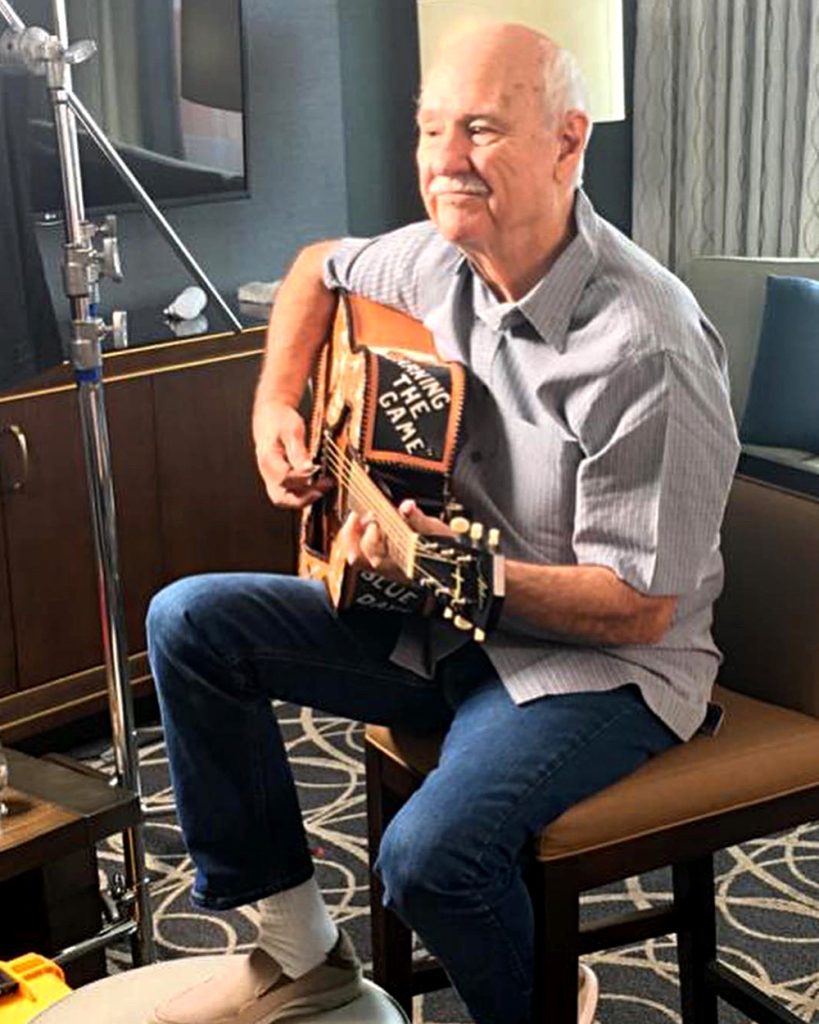- Phone : +(44) 123-456-7890
- Email : enquiries@tbhef.org
Sonny Curtis
From his west Texas origins, Sonny Curtis has gone on to become one of America’s most gifted singer-songwriters and performers. A key player in the legacy of Buddy Holly and the Crickets, he has been associated with the band for well over 60 years.

Emerging in the late 1950s, Sonny Curtis was one of the young West Texas musicians who best demonstrated the area’s fertile musical environment. He formed a duo with Waylon Jennings, performing at store openings and private functions. In fact, Waylon cited Sonny as his first role model. As rock and roll started to influence these young musicians, Sonny got directly involved in the new genre by accompanying Buddy Holly both on stage around the Lubbock area and on record. The latter happened when Buddy did his first Nashville session in 1956. Cutting ‘Blue Days, Black Nights’ and ‘Love Me’, Sonny gained the distinction of being the first person to play a Fender Strat on a rock and roll record. He developed a talent for songwriting too. The Buddy Holly cut ‘Rock Around with Ollie Vee’ was his initial attempt at writing a rock and roll song.
Towards the end of 1958, the Crickets – drummer Jerry Allison and bassist Joe B. Mauldin – had parted company with Buddy. Continuing as the Crickets, they enlisted Earl Sinks and Sonny Curtis on vocals and lead guitar, respectively. Now reformed, the Crickets began a renewed recording career with the Buddy Holly song ‘Love’s Made a Fool of You’, followed by ‘When You Ask About Love’, a Sonny Curtis/Jerry Allison co-write, both of which were minor hits in the UK. The group cut their first post-Buddy Holly album, In Style with the Crickets. This classic album also included ‘More Than I Can Say’ and ‘I Fought The Law’.
By 1959, the Crickets without Buddy Holly had lost some of their impetus and had now become a trio comprising Allison, Curtis and Mauldin, at which time they also became the regular backing band for the Everly Brothers. In February 1960, Sonny and Jerry Allison played on the historic last recordings of Eddie Cochran: ‘Three Steps to Heaven’ and ‘Cut Across Shorty’. Soon after, in March 1960, the Crickets accompanied the Everly Brothers on their first nationwide UK tour, which was a huge success. It was around this time that Sonny wrote his biggest copyright, ‘Walk Right Back’. He sang the first verse for Don and Phil, who recorded the song before he had the chance to write a second verse. Their recording became an instant worldwide hit.
In 1961 Sonny again teamed up with Jerry Allison, who was now based in Hollywood with a new recording contract on Liberty Records. Recording as the Crickets with Sonny on guitar and vocals, the band’s repertoire added more Sonny songs: ‘My Little Girl’, ‘Parisian Girl’ and ‘A Fool Never Learns’, which also gave Andy Williams a big hit. The mid-1970s saw the Crickets back on record with three albums showing a more contemporary side, and by 1978, the band, now consisting of Jerry, Sonny and Joe B. Mauldin, had relocated to Nashville and become part of Waylon Jennings’s touring show. This saw them playing to some of the biggest audiences of their career.
As well as playing with the Crickets, Sonny also acquired several solo recording deals through the years with various independent labels. He enjoyed a series of hit singles on the US country charts. One of these was ‘The Real Buddy Holly Story’, written after seeing the film The Buddy Holly Story, which included some errors that Sonny corrected in his song. In 1985, with a new recording deal under his belt, he undertook a short solo tour of the UK. It was a success, and for the next nine years Sonny made regular visits to the UK to delight audiences with his songs, superb guitar playing and wry sense of humour.
In 1994, Sonny teamed up with Jerry Allison and Joe B. Mauldin once again as the Crickets, working until the band’s retirement in 2016.
John Firminger
Subscribe to our newsletter
The Buddy Holly Educational Foundation is a registered charity in the United States and the United Kingdom, with a mission to extend musical education to new generations regardless of income or ethnicity or learning levels.

- 1023 15th Street N.W. Suite 1100 Washington DC 20005
- enquiries@tbhef.org
Office Hours
- Mon – Tue : 09 AM - 09 PM
- Wed – Thu : 09 AM - 08 PM
- Fri – Sat : 09 AM - 07 PM
- Sunday : Closed
© The Buddy Holly Educational Foundation 2023
